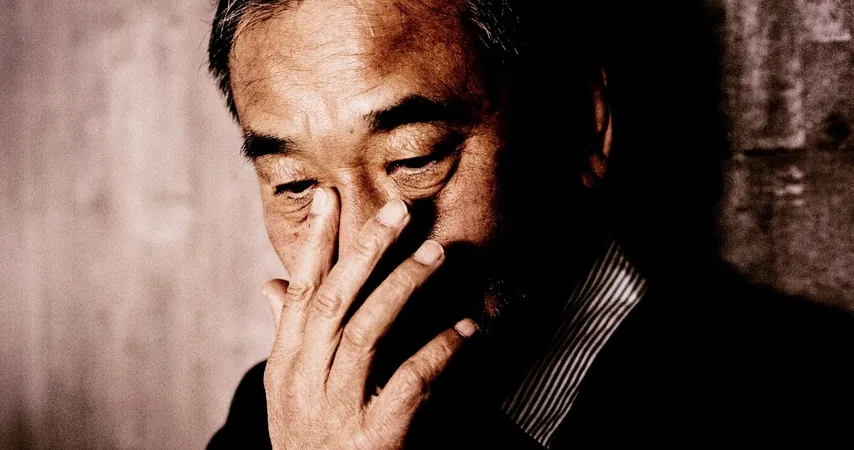
Has Haruki Murakami Lost His Literary Touch? A Deep Dive into His Latest Works
2024-11-19
Author: Ken Lee
Introduction
Haruki Murakami, a name synonymous with contemporary global literature, is at the center of a growing debate concerning his latest writing style. Once hailed as a master innovator whose works bridged cultural gaps and captured human emotions in a distinct manner, his recent novels are sparking concern among long-time fans and literary critics alike. Are these new stories a sign of a creatively waning author, or is he simply evolving in a direction that leaves his die-hard followers behind?
Increased Length and Complexity
Over the past decade, Murakami's works have seemingly embraced an increased length and complexity. His monumental novels, such as *1Q84* (2011) and *Killing Commendatore* (2017), clock in at an impressive 1,184 and 704 pages, respectively. Critics note that these hefty tomes often meander through introspection, leading some to accuse him of excessive maximalism—a stark departure from the minimalism often lauded in literary circles. In contrast to the Japanese ethos of *shibumi*, which celebrates simplicity and elegance, Murakami’s prose has begun to feel cumbersome and overstuffed.
A Duality in *The City and Its Uncertain Walls*
In 2023, Murakami released *The City and Its Uncertain Walls*, a novel that revisits the themes first explored in his 1985 classic, *Hard-Boiled Wonderland and the End of the World*. This new narrative, newly translated by Philip Gabriel, reflects a duality inherent in Murakami's late career: a simultaneous nostalgia for his earlier mastery and a troubling reliance on muddled storytelling interlaced with bathos and clichés.
Familiar Narratives
Originally penned as a brief story in 1980, Murakami’s new work unfolds across two narratives that intertwine but feel overwhelmingly familiar—a recycled plot for a brand of literary fanfiction rather than a groundbreaking exploration of new ideas. The protagonist—a nameless, mid-40s man—navigates through a faintly reminiscent fictive landscape that mirrors much of Murakami's previous imagination, yet appears less innovative and more tired. Such regression raises questions about the writer's evolution and whether his artistic voice remains singular in its originality.
Surrealism versus Depth
What is particularly striking in *The City and Its Uncertain Walls* is Murakami’s ability to invoke his signature surrealism while simultaneously sacrificing depth and intrigue. While colorful characters still roam the pages, their motivations and personalities often seem secondary, tools merely to facilitate the plot rather than fully realized beings. Critics lament that Murakami’s once vibrant worlds now feel superficial, with uninspired characterizations leaving readers blankly staring at the page.
Over-Sentimentality
Additionally, the novel's exploration of middle age and isolation sometimes drifts into overly sentimental territory—a far cry from the nuanced emotional landscapes of earlier works. The text leans heavily on themes of loneliness and reconnection in a post-pandemic world. However, where Murakami might have historically approached such subjects with subtlety and sophistication, *The City and Its Uncertain Walls* feels agonizingly literal, inviting little room for intellectual engagement.
Supporting Characters and Predictability
Moreover, the story dives into the lives of supporting characters with excruciating detail, such as the backstory of Mr. Koyasu, a former librarian. While rich character histories can elevate narratives, these feel over-explained in Murakami's latest work, detracting from the immediacy and urgency that once characterized his storytelling. Likewise, elements that once appeared as intriguing puzzles—like the oddities of the human experience—have shifted toward an overwhelming sense of predictability.
Conclusion
In conclusion, while Haruki Murakami continues to produce literature that reflects a unique voice, recent works such as *The City and Its Uncertain Walls* indicate a troubling trend. Many of his trademark quirks—wells, cats, and the persistent exploration of dreams—now feel overly formulaic, perhaps even tired. Whether this is a natural evolution of the author's career or a sign that Murakami has indeed 'lost the sauce' remains to be seen. Literary enthusiasts are left wondering: Can Murakami reclaim the elusive magic that made him a household name, or are we witnessing the twilight of a once-immortal literary figure? Only time will tell.



 Brasil (PT)
Brasil (PT)
 Canada (EN)
Canada (EN)
 Chile (ES)
Chile (ES)
 España (ES)
España (ES)
 France (FR)
France (FR)
 Hong Kong (EN)
Hong Kong (EN)
 Italia (IT)
Italia (IT)
 日本 (JA)
日本 (JA)
 Magyarország (HU)
Magyarország (HU)
 Norge (NO)
Norge (NO)
 Polska (PL)
Polska (PL)
 Schweiz (DE)
Schweiz (DE)
 Singapore (EN)
Singapore (EN)
 Sverige (SV)
Sverige (SV)
 Suomi (FI)
Suomi (FI)
 Türkiye (TR)
Türkiye (TR)